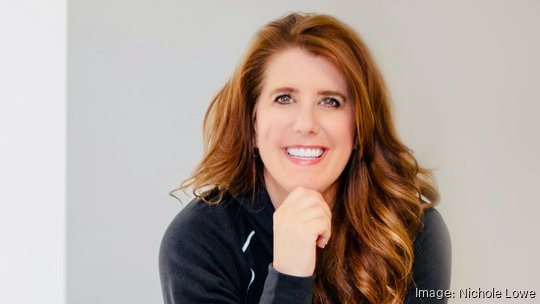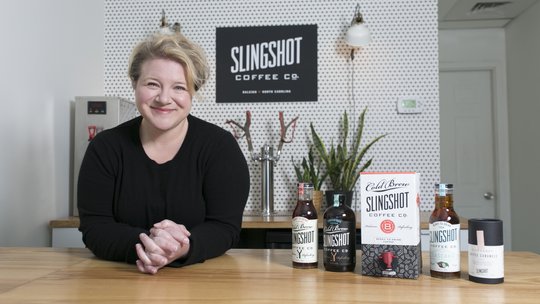
A year ago, it was “almost easy” to reel in hundreds of thousands of dollars, said Nichole Lowe, founder of venture-backed Zoee, a Raleigh startup developing a platform that enables coaching companies and independent coaches to automate, optimize, and scale their online businesses. But in 2023 the coffers are tightening – particularly for women.
Fundraising rounds are taking longer – and the "nos" are coming in faster, multiple female founders tell Triangle Inno.
“The runway is getting tight and scary – I think we’re all feeling it this year,” Lowe said.
While it's a tight market for everyone, statistics show getting those dollars is particularly tough for women founders across the country.
According to Pitchbook, companies solely founded by women secured just 2.1 percent of the total capital invested in venture-backed startups in the U.S. last year. Female-founded companies secured $6.8 billion in venture deals in the first quarter this year, compared to $15.5 billion in Q1 2022.
Part of the problem could be a lack of diversity among venture capital investors. Deloitte’s most recent Venture Capital Human Capital Survey found that southern VC firms lagged behind the rest of the nation in terms of percentage of surveyed workforce that is female. Nationally, the figure is 48 percent, versus 39 percent in the South.
But while women make up nearly half of the overall VC workforce across the country, they make up just 19 percent of those in the “investment partner or equivalent” category nationwide, according to the survey.
“We know for a fact it’s been an issue,” said Heather Gates, the managing director at Deloitte who authored the report, adding that while there’s been an uptick since the survey began eight years ago, “it’s still substantially less than the men, and what we know is that people like to invest in things that look like themselves, act like themselves, talk like themselves, and that trickles down.”
And that’s not good news for Lowe who, armed with an idea and a business plan, was able to close on more than $834,000 last year. The plan was to use the capital to build out and refine Zoee’s telehealth coaching platform, which not only matches coaches with clients but also offers back-office support, from video conferencing to note taking and client management.
A year later, she said she’s accomplished the mission with a product she’s proud of – but to really take off, she needs more capital.
“I have a little bit, but not much left,” she said of last year’s raise. So she returned to the road show, pitching a more mature Zoee, confident that since the idea itself solicited term sheets, the revenue-generating product would too. But she’s being met with more friction than last year.
She’s hearing a lot of “check with us next week” and “we can’t write a check until this summer.”
But she’s also optimistic – and doesn’t plan to stop pushing for the company she believes in.
A tough market all around
The majority of Triangle founders who have successfully raised capital say their rounds are taking longer – and that persistence, as well as patience, is key in 2023.
Chris Chuang, CEO of Relay in Raleigh, which recently closed on $13 million, said investors are asking for more information than they did in previous years.
In 2020 and 2021, “They were doing deals really fast.”
“But now, fundraises are, 'hey, even if I like your vision and your plan, I want to see you execute it for a few quarters or longer,'” Chuang said.
But despite the slower pace, rounds are being raised – including by female founders. Slingshot Coffee, founded by Triangle entrepreneur Jenny Bonchak, filed papers with the SEC this week disclosing another $1.8 million, bringing its latest round to nearly $2.3 million as of May 1.

In a recent interview, Bonchak said the coffee company, which recently launched a line of sparkling plant-based teas, has “a really great 2023 ahead of us,” with expansions planned at grocers such as Wegmans.
John Replogle, co-founder of one of Bonchak’s backers, Raleigh’s One Better Ventures, calls it a tough capital market all around and credits Bonchak’s persistence and her “ability to stare down a challenge."
His general advice for founders looking to fundraise is to treat capital raises like a “full-time job.”
“Commit to it, keep going, never take no for an answer, keep working your network – there’s always another way,” he said. Replogle also advises entrepreneurs raising money to avoid getting hung up on the idea of valuation as the measurement of their success in the current market.
“Valuations have been reset, and it’s really important that entrepreneurs reset their expectations," he said.
Investors say they are scouting startups – even in the current market. Due diligence is just taking longer. And many are making specific efforts to have a diverse portfolio.
Justin Wright-Eakes, founder of Oval Park Capital (which has invested in Zoee), said a third of his firm’s portfolio is made up of female founders.
“We don’t position ourselves as a DEI or ESG fund, but those are both things I’m passionate about… so I think you’ll see those elements across our portfolio companies,” he said.